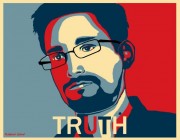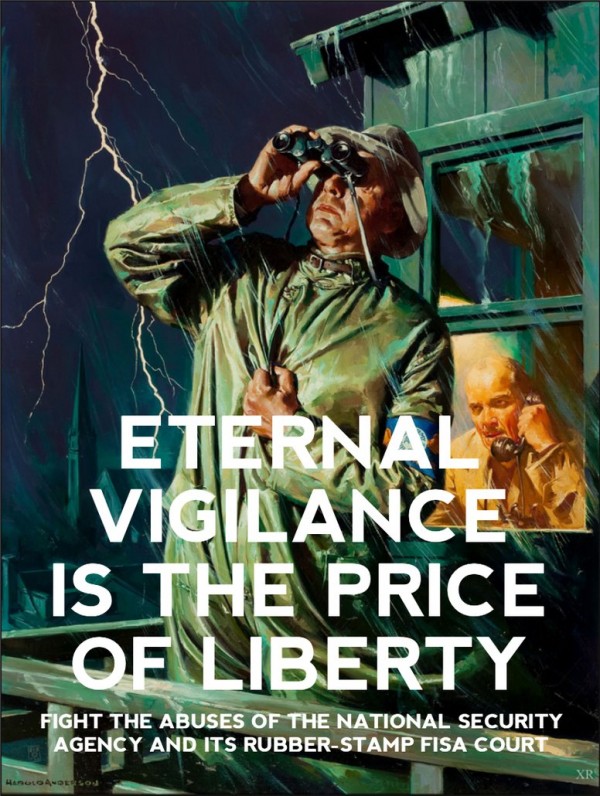Illustration by POASTERCHILD
NEW AMERICAN FOUNDATION: On June 5, 2013, the Guardian broke the first story in what would become a flood of revelations regarding the extent and nature of the NSA’s surveillance programs. Facing an uproar over the threat such programs posed to privacy, the Obama administration scrambled to defend them as legal and essential to U.S. national security and counterterrorism. Two weeks after the first leaks by former NSA contractor Edward Snowden were published, President Obama defended the NSA surveillance programs during a visit to Berlin, saying: “We know of at least 50 threats that have been averted because of this information not just in the United States, but, in some cases, threats here in Germany. So lives have been saved.” Gen. Keith Alexander, the director of the NSA, testified before Congress that: “the information gathered from these programs provided the U.S. government with critical leads to help prevent over 50 potential terrorist events in more than 20 countries around the world.” Rep. Mike Rogers (R-Mich.), chairman of the House Permanent Select Committee on Intelligence, said on the House floor in July that “54 times [the NSA programs] stopped and thwarted terrorist attacks both here and in Europe – saving real lives.”
However, our review of the government’s claims about the role that NSA “bulk” surveillance of phone and email communications records has had in keeping the United States safe from terrorism shows that these claims  are overblown and even misleading. An in-depth analysis of 225 individuals recruited by al-Qaeda or a like-minded group or inspired by al-Qaeda’s ideology, and charged in the United States with an act of terrorism since 9/11, demonstrates that traditional investigative methods, such as the use of informants, tips from local communities, and targeted intelligence operations, provided the initial impetus for investigations in the majority of cases, while the contribution of NSA’s bulk surveillance programs to these cases was minimal. Indeed, the controversial bulk collection of American telephone metadata, which includes the telephone numbers that originate and receive calls, as well as the time and date of those calls but not their content, under Section 215 of the USA PATRIOT Act, appears to have played an identifiable role in initiating, at most, 1.8 percent of these cases. MORE
are overblown and even misleading. An in-depth analysis of 225 individuals recruited by al-Qaeda or a like-minded group or inspired by al-Qaeda’s ideology, and charged in the United States with an act of terrorism since 9/11, demonstrates that traditional investigative methods, such as the use of informants, tips from local communities, and targeted intelligence operations, provided the initial impetus for investigations in the majority of cases, while the contribution of NSA’s bulk surveillance programs to these cases was minimal. Indeed, the controversial bulk collection of American telephone metadata, which includes the telephone numbers that originate and receive calls, as well as the time and date of those calls but not their content, under Section 215 of the USA PATRIOT Act, appears to have played an identifiable role in initiating, at most, 1.8 percent of these cases. MORE
WIKIPEDIA: The New America Foundation is an American non-profit, nonpartisan public policy institute and think tank focusing on a wide range of issues, including national security studies, technology, asset building, health, energy, education, and the economy. The organization is based in Washington, D.C., in addition to having a significant presence in New York City. In 2007, Steve Coll, a former managing editor of The Washington Post, became President of the New America Foundation.[1] Google‘s Executive Chairman, Eric Schmidt, is chairman of the foundation’s board of directors.[2] MORE
FOREIGN POLICY: I especially am becoming more sympathetic to Snowden the more current and former American intelligence officials talk about killing Snowden and holding forth in other ways. […] Second, until there is more accountability for the crimes  committed by U.S. intelligence officials over the last 10 years, I am not inclined to let secret policemen and spies be the moral arbiters of our society or the interpreters of our constitutional rights — in fact, I think the burden is on them, not on me. I was not the one who tortured people, kidnapped others, delivered captives into the hands of governments we knew would torture them, and also wormholed some of our constitutional rights. And I didn’t allow 9/11 to happen in the first place, and then get all panicky after that. If we are to ask if Snowden damaged U.S. intelligence operations, we also need to ask how much U.S. intelligence operations damaged the United States over the last 10 years. They will tell you that there is secret evidence of all the attacks they stopped. I will tell you that there is secret evidence of all the laws they broke — or at least, there was such evidence, until the tapes were destroyed. There are a lot of people calling for accountability for Snowden who seem blind to the much larger crimes committed by U.S. intelligence officials. MORE
committed by U.S. intelligence officials over the last 10 years, I am not inclined to let secret policemen and spies be the moral arbiters of our society or the interpreters of our constitutional rights — in fact, I think the burden is on them, not on me. I was not the one who tortured people, kidnapped others, delivered captives into the hands of governments we knew would torture them, and also wormholed some of our constitutional rights. And I didn’t allow 9/11 to happen in the first place, and then get all panicky after that. If we are to ask if Snowden damaged U.S. intelligence operations, we also need to ask how much U.S. intelligence operations damaged the United States over the last 10 years. They will tell you that there is secret evidence of all the attacks they stopped. I will tell you that there is secret evidence of all the laws they broke — or at least, there was such evidence, until the tapes were destroyed. There are a lot of people calling for accountability for Snowden who seem blind to the much larger crimes committed by U.S. intelligence officials. MORE
TOM DISPATCH: The debate Edward Snowden envisioned when he revealed the extent of National Security Agency (NSA) spying on Americans has taken a bad turn. Instead of a careful examination of what the NSA does, the legality of its actions, what risks it takes for what gains, and how effective the agency has been in its stated mission of protecting Americans, we increasingly have government officials or retired versions of the same demanding—quite literally—Snowden’s head and engaging in the usual fear-mongering over 9/11. They have been aided by a chorus of pundits, columnists, and present as well as former officials offering bumper-sticker slogans like “If you have nothing to hide, you have nothing to fear,” all the while claiming our freedom is in direct conflict with our security. It’s time to face these arguments directly. So here are ten myths about NSA surveillance that need debunking. Let’s sort them out. MORE
RELATED: In recent years, the government has treated the king of all checks and balances, the Constitution, like a used Kleenex. The secret Foreign  Intelligence and Surveillance Court (FISA) was set up to provide judicial oversight in a classified setting to the intelligence community. Theoretically, the government is required to make a compelling case for the issuance of orders authorizing electronic and other surveillance, physical searches, and compelled production of business records. Either the government is very good at making its case, or the court has become a rubber stamp: that secret FISA court approved all 1,789 requests submitted to it in 2012. The Patriot Act elevated a once rarely used tool, the National Security Letter (NSL), into the mainstream of government practice. National Security Letters are an extraordinary search procedure that gives the FBI the power to compel the disclosure of customer records held by banks, telephone companies, Internet service providers, public libraries, and others. These entities are prohibited, or “gagged,” from telling anyone about their receipt of the NSL. Though the Justice Department itself cited abuse of the letters by the FBI in 2008, in 2012 the FBI used 15,229 National Security Letters to gather information on Americans. NSLs do not require judicial approval and the built-in gag orders prevent anyone from seeking judicial relief; indeed, most people will never even know that they were the subject of an NSL. And at the moment, the Department of Justice is trying to keep classified an 86-page court opinion that determined the government violated the spirit of federal surveillance laws and engaged in unconstitutional spying. MORE
Intelligence and Surveillance Court (FISA) was set up to provide judicial oversight in a classified setting to the intelligence community. Theoretically, the government is required to make a compelling case for the issuance of orders authorizing electronic and other surveillance, physical searches, and compelled production of business records. Either the government is very good at making its case, or the court has become a rubber stamp: that secret FISA court approved all 1,789 requests submitted to it in 2012. The Patriot Act elevated a once rarely used tool, the National Security Letter (NSL), into the mainstream of government practice. National Security Letters are an extraordinary search procedure that gives the FBI the power to compel the disclosure of customer records held by banks, telephone companies, Internet service providers, public libraries, and others. These entities are prohibited, or “gagged,” from telling anyone about their receipt of the NSL. Though the Justice Department itself cited abuse of the letters by the FBI in 2008, in 2012 the FBI used 15,229 National Security Letters to gather information on Americans. NSLs do not require judicial approval and the built-in gag orders prevent anyone from seeking judicial relief; indeed, most people will never even know that they were the subject of an NSL. And at the moment, the Department of Justice is trying to keep classified an 86-page court opinion that determined the government violated the spirit of federal surveillance laws and engaged in unconstitutional spying. MORE
MOTHER JONES: In the midst of revelations that the government has conducted extensive top-secret surveillance operations to collect domestic phone records and internet communications, the Justice Department was due to file a court motion Friday in its effort to keep secret an 86-page  court opinion that determined that the government had violated the spirit of federal surveillance laws and engaged in unconstitutional spying. MORE
court opinion that determined that the government had violated the spirit of federal surveillance laws and engaged in unconstitutional spying. MORE
RELATED: Director of National Intelligence James Clapper directly lied to that check-and-balance branch of the government, Congress, in a public session. (He later termed his response the “least untruthful” answer.) And we wouldn’t even know that he lied, or much of anything else about the NSA’s surveillance activities here or globally, if it weren’t for one man’s courage in exposing them. The government had kept it all from us for 12 years and never showed the slightest sign of reconsidering any part of that policy. Without Snowden, we would not even know what needs checking and balancing. MORE

